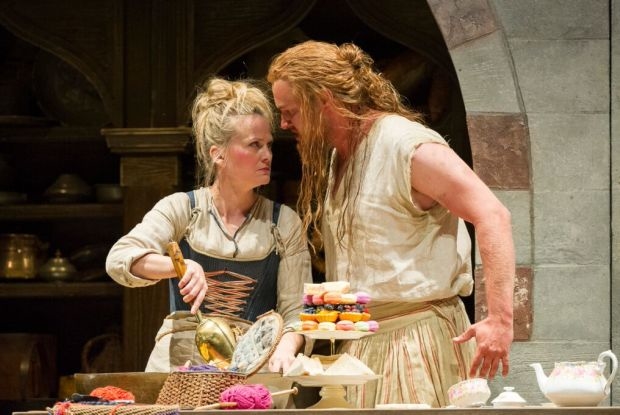Die Entführung aus dem Serail (Glyndebourne)
A powerful, truthful staging of Mozart’s comedy is a big hit for Glyndebourne

© Richard Hubert Smith
You’ll find none of it at Glyndebourne, that closed community outside Lewes where summer means posh togs and picnics to us but a boot camp of micro-rehearsal to the creatives. For the second time this season (following the revival of Carmen), David McVicar draws physical and emotional contibutions of extraordinary complexity from musicians whose day job, you’d think, is really just to sing.
Although a longtime Sussex staple, Mozart’s Die Entführung aus dem Serail (The Abduction from the Seraglio) has become an increasingly rare beast, perhaps because it’s a comedy from the past that touches on ticklish issues for the present, as westerners attempt to rescue other westerners from the harem of an Ottoman prince.
Some directors skirt round the libretto’s cultural clash by diverting its location, as Daniel Slater did with some success in his 2013 Garsington production (in which Pasha Selim became a Russian football club proprietor and the rescuing hero an aspiring manager). McVicar does the opposite: he takes the story at face value and proceeds to make it as real as possible. Abetted by those dynamic performances and Vicki Mortimer‘s detailed, exotic designs, the director tells it straight, without fear or favour. For good measure, as with Carmen, he includes all the dialogue as well.
'It’s all about showing truth'
That brings its own surprises, since in this complete telling it’s the murderous Osmin who emerges as the dominant character ahead of the lovers Belmonte and Konstanze. That's partly because the uncut text allows him extra stage time, but mainly because the German bass Tobias Kehrer breathes such vibrant life into the Pasha’s henchman. He sings as he acts, with an ideally judged delivery and a spark of wit that lets him bridge the gap between knockabout comedy (during a kitchen scene that turns into food-chucking, dish-smashing barney) and outright villainy.
The full text also pushes Selim himself more to the fore, since his is a speaking role, and French actor Franck Saurel gets the combination of haughtiness, self-loathing lust and goodness exactly right. The sight of this troubled man finding inner peace when he does the right thing by the woman he loves is immensely touching.
Sally Matthews and Edgaras Montvidas are very good value as the sundered lovers, Konstanze and Belmonte, even if neither voice is quite the last word in Mozartean freshness. Their respective servants, meanwhile, are played with dazzling comic invention and equally delightfully sung by Mari Eriksmoen (Blonde) and Brenden Gunnell (Pedrillo). The latter holds the stage like a Commedia king, unrecognisable from last summer’s saturnine Peter Quint at Holland Park.
On its season debut, the Orchestra of the Age of Enlightenment contributes limpid, sprightly and very classy Mozart playing under Glyndebourne’s music director, Robin Ticciati. The contrast between this and the previous night’s lolloping disappointment in the Royal Opera pit couldn’t be more marked. And that extends to the production itself: it’s all about showing truth, whereas Don Giovanni had been a celebration of artifice. How should companies be staging Mozart in the modern era? Come and see.












